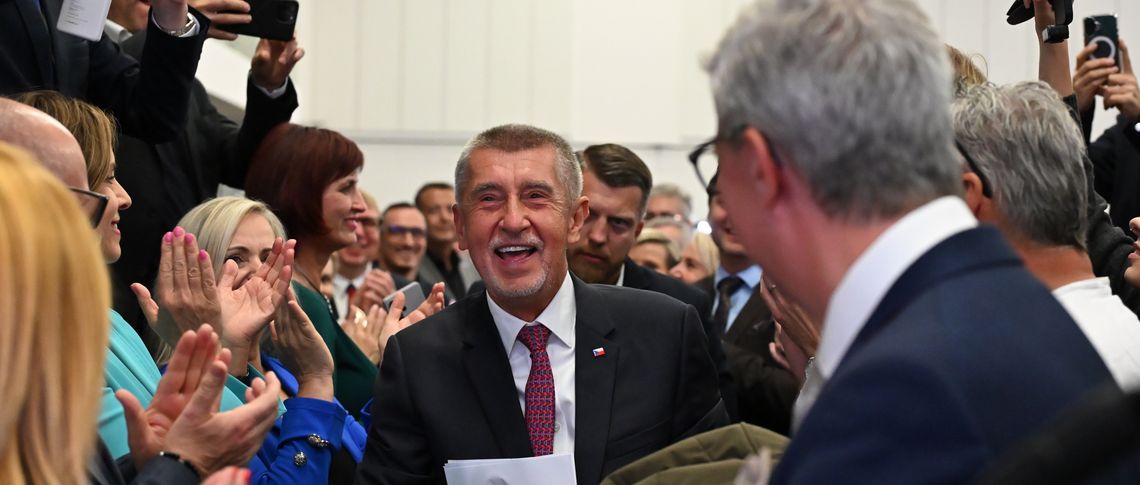The outcome of the Czech general elections came as no surprise: with almost 35 per cent of the vote, Andrej Babiš’s ANO party will most probably form the next government, and Babiš himself is poised to return as prime minister. The current prime minister, Petr Fiala, and his centre-right SPOLU grouping, on the other hand, are on their way into the opposition, with the future of the grouping and its leadership unclear. The election turnout was one of the highest in Czech history since 1993, likely due in large part to the ANO’s successful voter mobilisation. President Petr Pavel has not yet entrusted Babiš with forming a government, but it is expected that he will.
Babiš is back in the driver’s seat
However, the election also brought some rather unexpected developments. The radical left grouping Stačilo! (‘Enough!’) has not made it into the lower chamber of Parliament, despite what the election models had suggested. Together with the worse-than-expected result of the far-right SPD, this suggests that Czech voters are not interested in leaving key international institutions — both Stačilo! and SPD campaigned for a referendum on Czechia’s EU and NATO membership. Voters who might have been motivated by Stačilo!’s strong socio-economic and welfare programme instead opted for the ‘safer’ option of voting for ANO.
Another surprise is the success of right-wing Motoristé sobě (‘Motorists for Themselves’). This was their first time running in the general elections after having succeeded in the European Parliament elections last year. Although they had been hovering around the five per cent threshold required to enter the Chamber of Deputies for months, their actual result of 6.7 per cent exceeded expectations. Moreover, the Motorists are very close to actual government participation.
Babiš will probably want to avoid a three-party coalition, as this would make his coordinating role much more difficult.
Looking at the number of mandates, ANO cannot form a majority government by itself. The party has already declared that its preferred outcome would be a minority government supported by the SPD and the Motorists. However, over the weekend, the Motorists signalled that they require direct participation in the government; otherwise, no support for the government can be expected from them. The SPD, meanwhile, has also said that it would like to appoint its ‘experts’ to certain ministerial posts. However, the negotiations have barely started and could still take a different turn according to what Babiš and his team manage to offer both the Motorists and the SPD.
Babiš will probably want to avoid a three-party coalition, as this would make his coordinating role much more difficult. In addition, one-third of the future SPD MPs are members of smaller parties that ran on the SPD ticket, which will likely cause instability sooner or later. While both ANO and the Motorists hold Eurosceptic positions – both belonging to the Patriots for Europe group in the European Parliament – neither of them is actually calling for the Czech Republic to leave the EU. The SPD, on the other hand, is much more radical in its foreign policy stances, including questioning not only Czechia’s membership of the EU, but also its membership of NATO. This is where President Pavel comes into play, who, already before the elections, claimed that he would have a problem appointing a minister who refused Czechia’s EU membership.
Lastly, as the Motorists are newcomers to high-level politics, Babiš may consider them an easier coalition partner to control. In this case, a minority government could be formed consisting of ANO and the Motorists, and supported by the SPD. Support for such a government could also be found among the Civic Democrats (ODS, the largest party in SPOLU), with whom the Motorists share certain connections.
Czech foreign policy at a crossroads
Both ANO and the Motorists are aligned in their preference for a European Union of strong member states, and in their opposition to any deepening of integration. Their government would put a strong emphasis on the re-evaluation of the Green Deal and decarbonisation measures, with an outright refusal to implement the new emissions trading system (ETS2). Both parties also refuse to implement the EU migration pact. On all these issues, they will align with Hungary’s Viktor Orbán. In fact, no matter who ANO’s coalition partner will be, relations with Hungary and Slovakia will intensify. At the same time, an ANO-led government would also like to maintain good bilateral relations with other partners in Western Europe. Neither ANO nor the Motorists have any interest in changing Czech relations with Russia, and despite their political alignment with Orbán’s Hungary, they are not expected to support blocking EU sanctions against Russia.
Compared to Fiala’s term, the government’s support for Ukraine in its defence against Russian aggression will definitely lose prominence on the agenda. This applies to rhetoric as well as an actual re-evaluation of financial and military support, including the ammunition initiative. Although Czechia does not rank among the biggest donors to Ukraine in terms of numbers, the ammunition initiative has required substantial resources on the Czech side and has been appreciated by Ukraine itself, as well as by other partners. Andrej Babiš and ANO have emphasised the need for increased transparency of the initiative and have criticised the extent to which defence industry businesses (mainly the Czechoslovak Group, with whose owner, Michal Strnad, Babiš has tense relations), stopping short of arguing for the initiative to be terminated altogether. However, it is unclear to what extent the changes that ANO would like to make to the initiative would allow it to continue efficiently. Meanwhile, experts in the field say that a suggested move of the initiative coordination to the NATO level would not be realistic.
Both ANO and the Motorists emphasise the importance of strong transatlantic relations and, in particular, their sympathies for Donald Trump and his leadership style.
Both ANO and the Motorists emphasise the importance of strong transatlantic relations and, in particular, their sympathies for Donald Trump and his leadership style. As prime minister, Babiš would undoubtedly like to visit the White House again. This could be complicated by ANO’s (and its voters’) ambivalent positions on meeting NATO’s defence spending commitments. While not directly rejecting the five per cent target, ANO argues that a GDP percentage makes little sense, and that the emphasis should be put on spending money efficiently and acquiring assets that will undoubtedly bolster the country’s defence capabilities. This approach appears to be an attempt to cater to their voter base, who are not unified on the issue, and a significant portion of whom support ANO for socio-economic reasons.
When it comes to the Israeli war in Gaza, no active change of Czechia’s unequivocal support for Israel is to be expected. However, Babiš may be more open to persuasion by a European majority on this issue than the Fiala government, given that it is not as important to him.
All in all, the future Czech government’s foreign and European policies will be different from the ones we have seen in the past four years — mostly because they will not be as prominent on the overall governmental agenda. The most visible changes will be a toned-down approach to the support of Ukraine and a more outspokenly critical stance towards the European Union, which could have a negative long-term impact on public discussion in the Czech Republic. The president is likely to engage more actively in order to maintain an image of the Czech Republic as a constructive and reliable partner to its international partners, and to emphasise the value of EU membership to Czech society. To avoid another dent in the unity of the EU, European partners should be ready to seek just as good working relations with the future Czech government, rather than alienating it prematurely.






